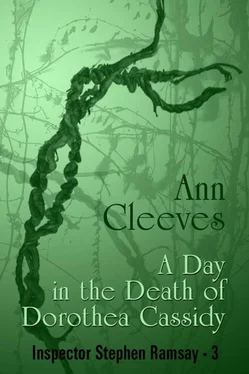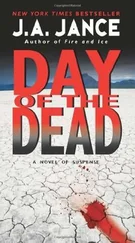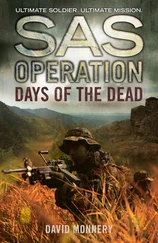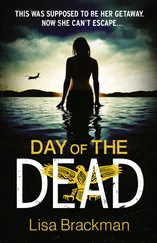Ann Cleeves - A Day in the Death of Dorothea Cassidy
Здесь есть возможность читать онлайн «Ann Cleeves - A Day in the Death of Dorothea Cassidy» весь текст электронной книги совершенно бесплатно (целиком полную версию без сокращений). В некоторых случаях можно слушать аудио, скачать через торрент в формате fb2 и присутствует краткое содержание. Жанр: Детектив, на английском языке. Описание произведения, (предисловие) а так же отзывы посетителей доступны на портале библиотеки ЛибКат.
- Название:A Day in the Death of Dorothea Cassidy
- Автор:
- Жанр:
- Год:неизвестен
- ISBN:нет данных
- Рейтинг книги:5 / 5. Голосов: 1
-
Избранное:Добавить в избранное
- Отзывы:
-
Ваша оценка:
- 100
- 1
- 2
- 3
- 4
- 5
A Day in the Death of Dorothea Cassidy: краткое содержание, описание и аннотация
Предлагаем к чтению аннотацию, описание, краткое содержание или предисловие (зависит от того, что написал сам автор книги «A Day in the Death of Dorothea Cassidy»). Если вы не нашли необходимую информацию о книге — напишите в комментариях, мы постараемся отыскать её.
A Day in the Death of Dorothea Cassidy — читать онлайн бесплатно полную книгу (весь текст) целиком
Ниже представлен текст книги, разбитый по страницам. Система сохранения места последней прочитанной страницы, позволяет с удобством читать онлайн бесплатно книгу «A Day in the Death of Dorothea Cassidy», без необходимости каждый раз заново искать на чём Вы остановились. Поставьте закладку, и сможете в любой момент перейти на страницу, на которой закончили чтение.
Интервал:
Закладка:

Ann Cleeves
A Day in the Death of Dorothea Cassidy
The third book in the Inspector Ramsay series, 1992
Chapter One
Two boys found Dorothea Cassidy in Prior’s Park. It was June, Midsummer’s Day. Although it was only seven in the morning it had been light for hours. The boys were on their way to begin a newspaper round and took a short cut, as they always did, along a footpath through the park. Cycling was forbidden but at that time in the morning there was no one to complain. The boys were in high spirits. It was the week of the midsummer carnival and they had spent the evening before at the fun fair on Abbey Meadow. They were over-tired, but excited at the prospect of another night at the fair. They shouted to each other, riding over the short grass, their tyres making tracks in the dew. The day was clear but there was still a trace of mist over the River Otter, winding through the ruins of the abbey and the spokes of the Big Wheel on the opposite bank. Later it would be hot.
The park was extensive and well laid out – in the summer months coach parties came from all over Northumberland to see the rose gardens. The boys rode past the children’s swings and the tennis courts then followed the path along the river which led towards the centre of town.
Dorothea was lying in a border of flowers close to the path. The border was still in the shadow thrown by the tall trees and shrubs beyond it, but even in the shade it would have been impossible to miss her. She wore sky-blue dungarees and a knitted jacket in blues and golds. On her feet were sandals made of red, plaited leather. Her hands were folded across her breast so they could see her wedding and engagement rings against the brown skin of her long fingers. She was lying on her back, crushing the small plants beneath her, and despite the rich soil and the leaf mould her face was quite clean.
The first boy braked sharply and almost caused a collision. They dismounted and stared, not believing what they saw. She looked like part of the design of the flower bed, surrounded by the brightly coloured and symmetrically patterned plants.
Both boys were fourteen and thought they were tough but even a regular diet of horror movies had not prepared them for the reality of what now confronted them. They looked around for adult help.
The younger boy came to his senses more quickly. He began to see the potential of the discovery. They might get their names in the papers, he said. It might even provide an excuse for a morning off school.
‘One of us should stop here,’ he said, ‘and the other should fetch the police. Do you mind staying?’
The other shook his head. He could not take his eyes off the woman. He thought she was like a statue from a museum. Her skin was blue and looked very cold. He was tempted to touch her, almost expecting the hard, smooth surface of plaster or marble but he knew better than to do that. He had heard about fingerprints. He watched Jamie pedal furiously away towards the town centre, then turned back to her. He had never seen anyone so beautiful. There must be something wrong with him, he thought. He must be really weird. How could anyone fancy a dead woman? He crouched protectively by the flower bed, watching her. A breeze from the river scattered the petals of a dying flower and one rested on her cheek like a tear.
When Detective Inspector Stephen Ramsay was woken by the telephone he expected the call to concern work. Who else would phone at six thirty in the morning? Yet when he heard his aunt, speaking in such a loud, shrill voice that he held the receiver at arm’s length, he was not surprised. She had been widowed for twenty years but kept the same hours as when her husband had worked down the pit and had needed a good breakfast inside him before he went out. She considered it a wickedness for anyone able-bodied to be in bed after seven in the morning. A wickedness and a waste.
‘Well,’ she demanded. ‘Have you found her?’
Ramsay leaned across the bed and pulled open the curtains. The early sunlight made the trees on the other side of the dene seem very close and he could hear wood pigeons through the open window.
‘I’m at home,’ he said mildly, ‘not at work. They hadn’t done when I left last night.’
‘This is serious,’ she said. ‘She wouldn’t just wander off. Not Mrs Cassidy.’
‘I know,’ he said. ‘We’re taking it seriously.’ He had learned that it did no good to lose his temper with her. Her persistence was unaffected by anger. If he answered her questions she would eventually leave him alone.
‘Well,’ she said, ‘ I hope you are. Everyone here’s very upset.’
She had her own flat in a sheltered accommodation scheme run by a local housing association. The move from the old coal-board cottage had given her a new lease of life. She was into everything there, knew everyone’s business. The other elderly residents held her in regard because she claimed a direct line to the police. They felt it gave the building special protection. She encouraged them in that belief and he had often been phoned at unwelcome times about missing pension books and the horror of dogs fouling the communal garden. He visited her once a week to have tea in the little over-heated living room and quite often there would be a queue of residents waiting in the corridor to consult him as if he were the chiropodist. She would show them in one at a time and he would do his best to answer their questions and satisfy their demands.
Hunter, his sergeant, would mock the weekly visit to the old people’s flats but Annie had always been Ramsay’s favourite aunt and, despite the demands she made on him, he still felt a responsibility and an exasperated affection for her. When Stephen was a child Annie had seemed less worn out, less worn down than the other women he knew, perhaps because she had no children of her own. There had also been something theatrical about her. His mother had disapproved of her and said she showed off. But Annie had been the provider of treats – the best seats at the panto at Christmas, picnics in the dunes at Druridge Bay – and while other adults’ attempts to please often left him with a sense of anti-climax, her treats were as magnificent in reality as they had been in expectation.
It was Annie Ramsay who had phoned him the evening before about the disappearance of Dorothea Cassidy.
‘She was supposed to be speaking at our social club half an hour ago,’ she had said, as if it were his fault. ‘But she’s not turned up.’
‘Give her a chance,’ he had said. ‘Perhaps she’s ill or her car’s broken down. Or got held up in the carnival traffic. You know what the roads are like this week. Perhaps she’s just forgotten.’
‘Aye,’ Annie said. ‘Maybe. She’s a bit of a reputation as a scatterbrain.’
And Ramsay thought that with that observation he would be left in peace. But three quarters of an hour later Annie was on the phone again.
‘She’s still not here,’ she said. ‘ I’ve just been in touch with her husband. He’s not seen her since this morning. And if her car had broken down she would have rung. She had this talk in her diary. I watched her write it down myself. You’ll have to do something.’
So Ramsay had done something. It hadn’t been easy to persuade his colleagues in Otterbridge police station to take her disappearance seriously. There was the fair and the folk festival and they were all busy. But in the end they had listened. Other women might run off with their fancy men, get legless in Idols Nightclub in Whitley Bay and have to sleep it off on a friend’s sofa before they dared go home to their husbands. But this was no ordinary woman. Dorothea Cassidy was a vicar’s wife.
Читать дальшеИнтервал:
Закладка:
Похожие книги на «A Day in the Death of Dorothea Cassidy»
Представляем Вашему вниманию похожие книги на «A Day in the Death of Dorothea Cassidy» списком для выбора. Мы отобрали схожую по названию и смыслу литературу в надежде предоставить читателям больше вариантов отыскать новые, интересные, ещё непрочитанные произведения.
Обсуждение, отзывы о книге «A Day in the Death of Dorothea Cassidy» и просто собственные мнения читателей. Оставьте ваши комментарии, напишите, что Вы думаете о произведении, его смысле или главных героях. Укажите что конкретно понравилось, а что нет, и почему Вы так считаете.












